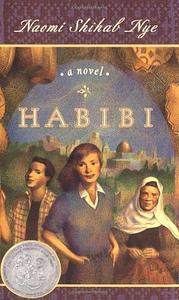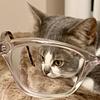Take a photo of a barcode or cover
I have been reading Nye's poetry for some time. I am older than her intended audience, but figured that was not a problem. Poetry does not have an age limit in either direction.
Nye is Palestinian and so I wanted to know more about her other writings and how her background affects what she writes. So I picked up her most well-know work, Habibi. This was a quick read for me, about 300 pages aimed at young adult readers. Given all that affects the Palestinian story, I believe Nye has done a good job with this novel. Many young readers could relate to the story of a teen being taken out of her comfort zone. That gives them entry into this complicated story.
I have personal feelings about the Palestinian-Israeli mess, my college roommate is Israeli, but I believe we have all lost our way in this violence. I found Mornings in Jenin more realistic, but Habibi is good for its intended audience.
I recommend this book to American teens who don't understand that others' lives are affected by US politics, to those who think they have a great deal of pain in their lives and to those teen readers that are curious about the rest of the world.
Nye is Palestinian and so I wanted to know more about her other writings and how her background affects what she writes. So I picked up her most well-know work, Habibi. This was a quick read for me, about 300 pages aimed at young adult readers. Given all that affects the Palestinian story, I believe Nye has done a good job with this novel. Many young readers could relate to the story of a teen being taken out of her comfort zone. That gives them entry into this complicated story.
I have personal feelings about the Palestinian-Israeli mess, my college roommate is Israeli, but I believe we have all lost our way in this violence. I found Mornings in Jenin more realistic, but Habibi is good for its intended audience.
I recommend this book to American teens who don't understand that others' lives are affected by US politics, to those who think they have a great deal of pain in their lives and to those teen readers that are curious about the rest of the world.
This one still holds up, even these many years later.
I have had this book forever, since before our program switched to our most recent curriculum, and Naomi Shihab Nye was in the old one. I've always meant to read it as a bit of professional necessity, but never got around to it. Finally did it this week, to mixed reactions.
This book was published in 1999, and it was, indeed, a much different time for the context of the book than it is now. Oslo was still new, before the Second Intifada, and I think there was still some hope floating about; that hope, at least on Nye's part, is still there in this book. I will also acknowledge that most of the book is set in Jerusalem, or at least on its outskirts, and that is a different world than the West Bank, so much of what transpires could, perhaps, still, theoretically, at least, be somewhat possible there. Perhaps.
The story is about a Palestinian-American family that moves to Jerusalem. Dad, Palestinian, has grown up there; Mom is American and has never been there; kids are obviously both but have grown up entirely in the US. The parts of the book that deal with what Palestinian-Americans do and what happens to them are, for the most part, spot on - incredibly accurate, down to the names of businesses they frequent. But less accurate are some of the other parts of the book, like what Palestinians who have always lived here do, or just some of the other parts - details as well as big, sweeping story arcs - of the plot. There is a Muslim shop owner who hangs Hindu icons in his shop, for example - seems unlikely. The dad in the story has an entirely Muslim family, but he himself appears to be Christian somehow (conversion, you'd think, but the story makes it seem like he was raised Christian, knowing the Christian liturgical traditions of Palestine...?), and the kids also seem to have been raised Christian with absolutely no knowledge of Islam (again, possible, I guess, but unlikely). The father strikes a soldier, is arrested, then released the same day; in the middle, Liyana grabs a taxi that doesn't charge her anything and goes directly to the jail, where she successfully demands the guards give her a spur-of-the-moment visit with him. !! And the relationship between Liyana and Omer, her love interest (who just happens to be Jewish, of course), could be possible, and of course such things are real, but the utter lack of anything other than very superficial problems that all get resolved in the last 1/4 of the book by Omer looking sincere and utterly some phrases in Arabic to her grandmother seems absolutely laughable and unbelievable. It's a starry-eyed, naive view of this place, one that desperately believes everything will just magically work out if individual teenagers just fall in love, apparently.
I'd like to see what Naomi Shihab Nye would write about here, now, in 2018. I wonder if her writing would still be colored by such optimism, even for a story based in Jerusalem.
This book was published in 1999, and it was, indeed, a much different time for the context of the book than it is now. Oslo was still new, before the Second Intifada, and I think there was still some hope floating about; that hope, at least on Nye's part, is still there in this book. I will also acknowledge that most of the book is set in Jerusalem, or at least on its outskirts, and that is a different world than the West Bank, so much of what transpires could, perhaps, still, theoretically, at least, be somewhat possible there. Perhaps.
The story is about a Palestinian-American family that moves to Jerusalem. Dad, Palestinian, has grown up there; Mom is American and has never been there; kids are obviously both but have grown up entirely in the US. The parts of the book that deal with what Palestinian-Americans do and what happens to them are, for the most part, spot on - incredibly accurate, down to the names of businesses they frequent. But less accurate are some of the other parts of the book, like what Palestinians who have always lived here do, or just some of the other parts - details as well as big, sweeping story arcs - of the plot. There is a Muslim shop owner who hangs Hindu icons in his shop, for example - seems unlikely. The dad in the story has an entirely Muslim family, but he himself appears to be Christian somehow (conversion, you'd think, but the story makes it seem like he was raised Christian, knowing the Christian liturgical traditions of Palestine...?), and the kids also seem to have been raised Christian with absolutely no knowledge of Islam (again, possible, I guess, but unlikely). The father strikes a soldier, is arrested, then released the same day; in the middle, Liyana grabs a taxi that doesn't charge her anything and goes directly to the jail, where she successfully demands the guards give her a spur-of-the-moment visit with him. !! And the relationship between Liyana and Omer, her love interest (who just happens to be Jewish, of course), could be possible, and of course such things are real, but the utter lack of anything other than very superficial problems that all get resolved in the last 1/4 of the book by Omer looking sincere and utterly some phrases in Arabic to her grandmother seems absolutely laughable and unbelievable. It's a starry-eyed, naive view of this place, one that desperately believes everything will just magically work out if individual teenagers just fall in love, apparently.
I'd like to see what Naomi Shihab Nye would write about here, now, in 2018. I wonder if her writing would still be colored by such optimism, even for a story based in Jerusalem.
A great read for teens trying to understand the Arab/Israeli conflict. Fourteen-year-old Liyana moves to Israel, where her Jewish father was born. Her life changes when she meets Omer.
i read this book for middle school book club and it was my favorite out of the ones we read that year. the plot was good, the writing was beautiful and elegant, the characters were captivating, and i wish i remembered more of the plot. i want to reread this again because it was one of the first diverse books i read and i just really remember loving it and the book making me think and become interested in other cultures and history. i also got to meet the other and she signed my book, and she was really sweet and kind and a good person, she spoke about her life and experiences and i wish i could remember more, but i'd love to have a conversation with her, especially now.
Habibi was a breathtaking view into civilian life in Palestine, fragrant with olives and almond blossoms. Naomi Shihab Nye is one of my favorite poets so it was nice to see her prose can be just as engaging.



